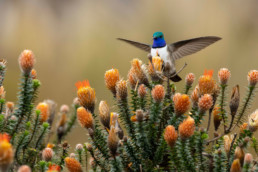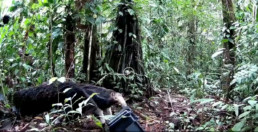Dear friends,
For Earth Day we highlight the work of the Jocotoco Foundation based in Ecuador.
Ecuador is a mega-diverse country with the highest biodiversity per area of any country. Many species in Ecuador are found only in very small areas (endemics). Tiny Ecuador is home to 16% of the world’s bird and 10% of the world’s amphibian species. Ecuador was the first country to give nature constitutional rights and it has protected close to 20% of its land and sea territory. In spite of these successes, the threats remain. For example, over 95% of forest has been lost in the lowlands of western Ecuador.
The Blue-throated Hillstar was only recently discovered and the world population is between 80-120 individuals. Photo: Murray Cooper
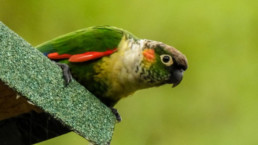
The population of many parrots is limited by the availability of nest cavities because so many trees have been cut down. A nest box program provides homes to these birds like this rare White-breasted Parakeet until the forest can regrow. Photo: Byron Puglia.
Jocotoco was established in 1998 to protect the many endangered and endemic species which are still not protected by Ecuador’s relatively extensive system of protected areas. In 25 years, Jocotoco has established 18 conservation reserves totalling over 40,000 ha.
The foundation’s first reserve was established to protect the Jocotoco Antpitta is south-eastern Ecuador – then a new species to science. The foundation flourished and initially focused on protecting endangered birds like the El Oro Parakeet, Ecuadorian Tapaculo, Pale-headed Brush Finch, Great Green Macaw, Black-breasted Puffleg and Andean Condors.
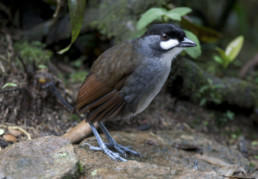
The Jocotoco Antpitta was discovered in 1998 in southern Ecuador. The population is thought to be around 500. Photo: Doug Wechsler
Jocotoco now protects over 10% of all the world’s bird species in just 0.00003% of the world’s land area.
Jocotoco quickly recognized that to protect endangered birds, they had to protect the habitats and ecosystems in which they lived. This meant working with many stakeholders, communities, and governments in order to protect larger areas. The results have been astonishing, showing how resilient nature can be if given a chance! In all its reserves, Jocotoco has seen a marked increase in rare species, especially in areas reforested to reconnect remaining old growth forest patches.
“I have watched and supported Jocotoco since they first were formed. It is inspiring to see how much land and critical habitat has been conserved in just 25 years and how well this has been supported by the communities and governments in Ecuador. Seeing these natural ecosystems recover so quickly with protection is a very hopeful message for Earth Day!”
Jerry Bertrand, Founding Board Member ICF
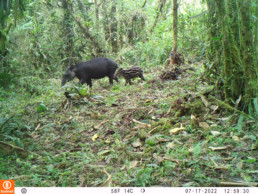
With habitat protection on conservation reserves, large mammals like these Mountain Tapirs have returned and are increasingly common. Photo: Jocotoco
Protecting the Lowland Chocó
ICF and its staff have been supporting Jocotoco’s major initiative to protect the Chocó Forest Ecosystem since 2016. With less than 2% of the original forest remaining in this species and endemic rich area, the situation is still critical. To date over 15,000 ha has been protected by Jocotoco and its partners and a connection has been established between Jocotoco’s reserve and Cotocachi-Cayapas, one of Ecuador’s largest national parks. While much more work remains to be done, the establishment of these protected areas is ensuring the long-term survival of healthy populations of Jaguars, Harpy Eagles, and Peccaries. The removal of hunting pressure has seen the return of shy species like the Great Curassow, and recently a Giant Anteater.
Click to view this video of a Giant Anteater at Jocotoco’s Canandé Reserve: one of the first records of this species west of the Andes in a very long time.
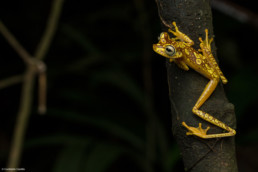
Photo: Humberto Castillo
Canandé Reserve becomes Ecuador’s Newest National Park
In November 2023, the Government of Ecuador included 2900 ha (about 25%) of Jocotoco’s Canande Reserve into the National Park System. The advantage is that this provides legal protection from all extractive uses – particularly mining. Jocotoco is working with the government and community groups to include the remaining areas. You can see Canande as Ecuador’s newest national park — # 78 on the attached map. This brings Ecuador’s National Park System coverage to almost 20% of the country.
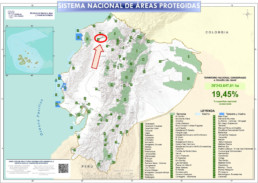
Science Innovation in the Chocó
Effective conservation depends on having the best knowledge available. When Jocotoco started to work in the Chocó in 2000, almost nothing was known about the area and how complex it was. It was a very difficult region of the world to reach and get access to.
After much preliminary work, a coalition of German, Ecuadorian and other international researchers established a research program to explore and understand the Chocó. This led to the formation of the REASSEMBLY project led by Nico Blüthgen and Martin Schaefer – funded by the German Science Foundation.
In short, this is targeted research to understand how complex tropical forest ecosystems work and how ecosystems reassemble themselves after disturbance from forestry or agriculture. The GOOD NEWS is that almost everything can return within a human generation – nature is resilient if given a chance!
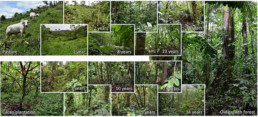
This photo montage shows some of the ecological conditions and age categories of forest being studied by researchers. Photo: REASSEMBLY.
Join us at Chautauqua!
Effective conservation depends on having the best knowledge available. When Jocotoco started to work in the Chocó in 2000, almost nothing was known about the area and how complex it was. It was a very difficult region of the world to reach and get access to.
After much preliminary work, a coalition of German, Ecuadorian and other international researchers established a research program to explore and understand the Chocó. This led to the formation of the REASSEMBLY project led by Nico Blüthgen and Martin Schaefer – funded by the German Science Foundation.
Join us at Chautauqua!
Thanks from all of us and happy spring!
David, Molly, Scott, Jerry, Meade, Wayne and Doug

